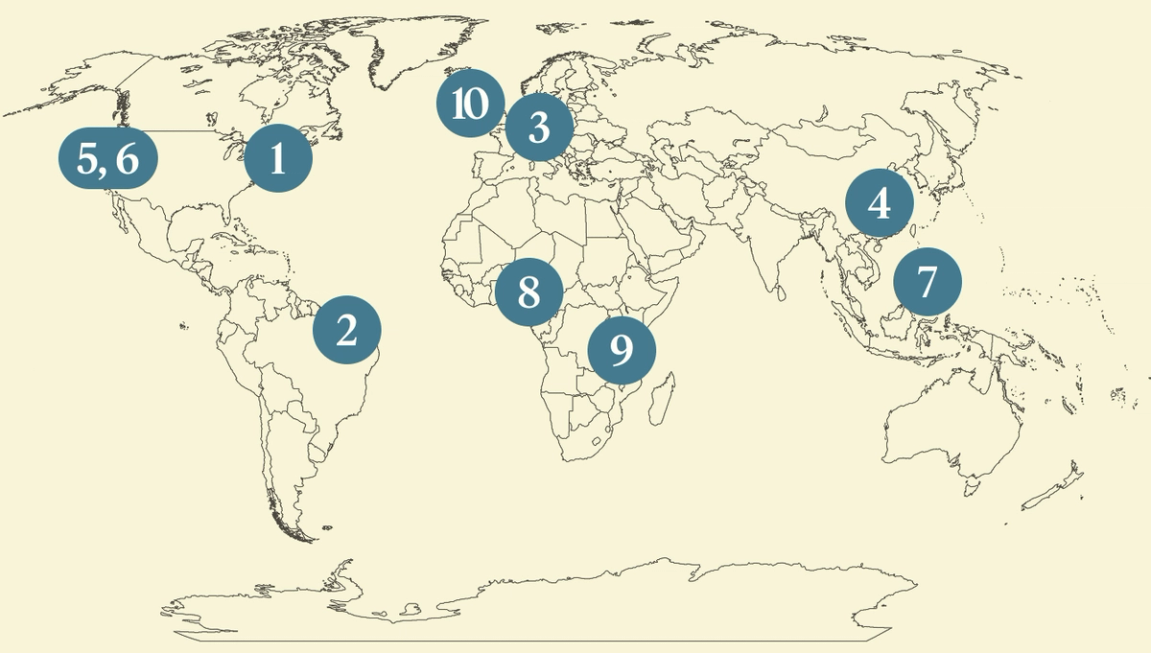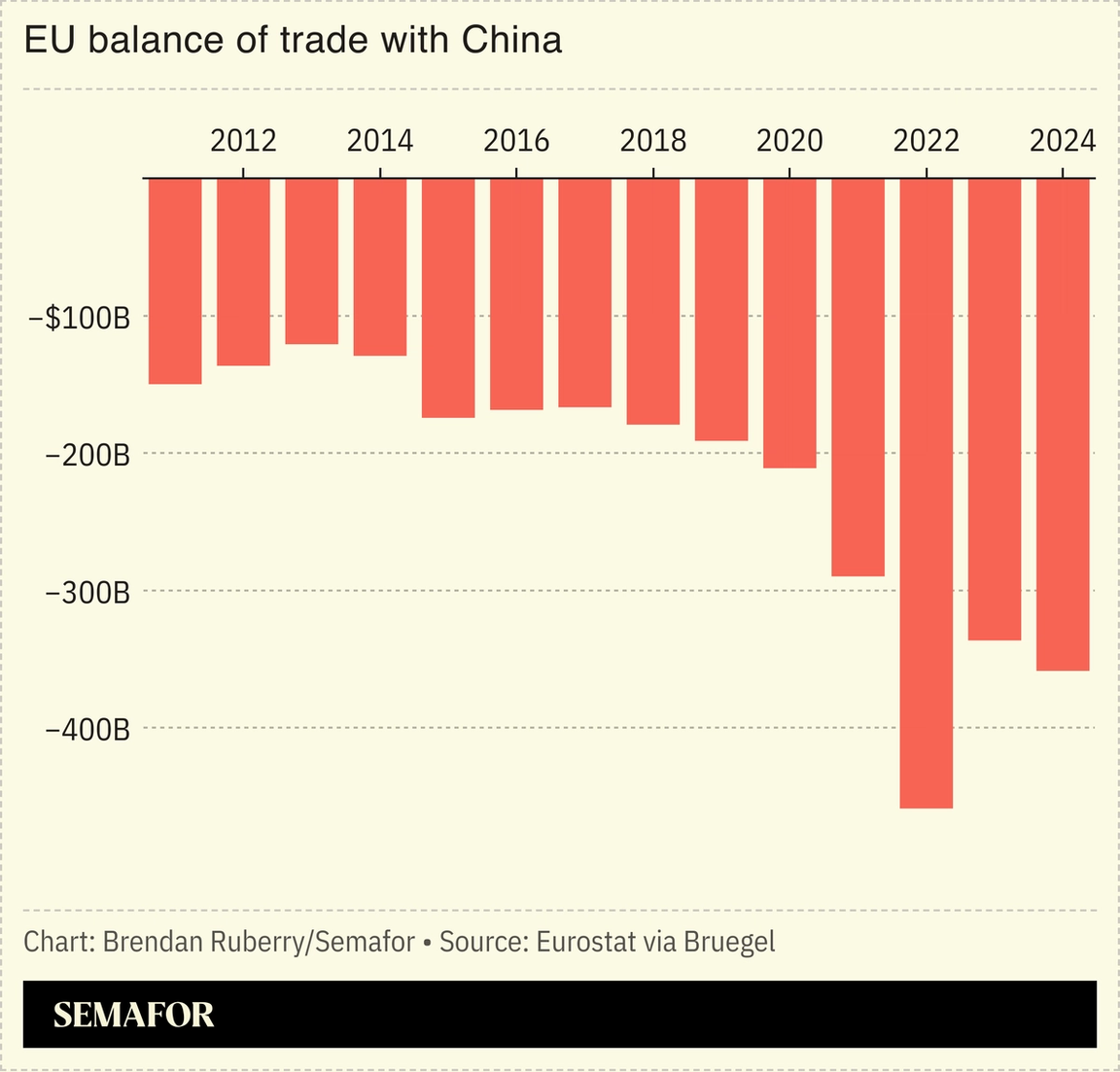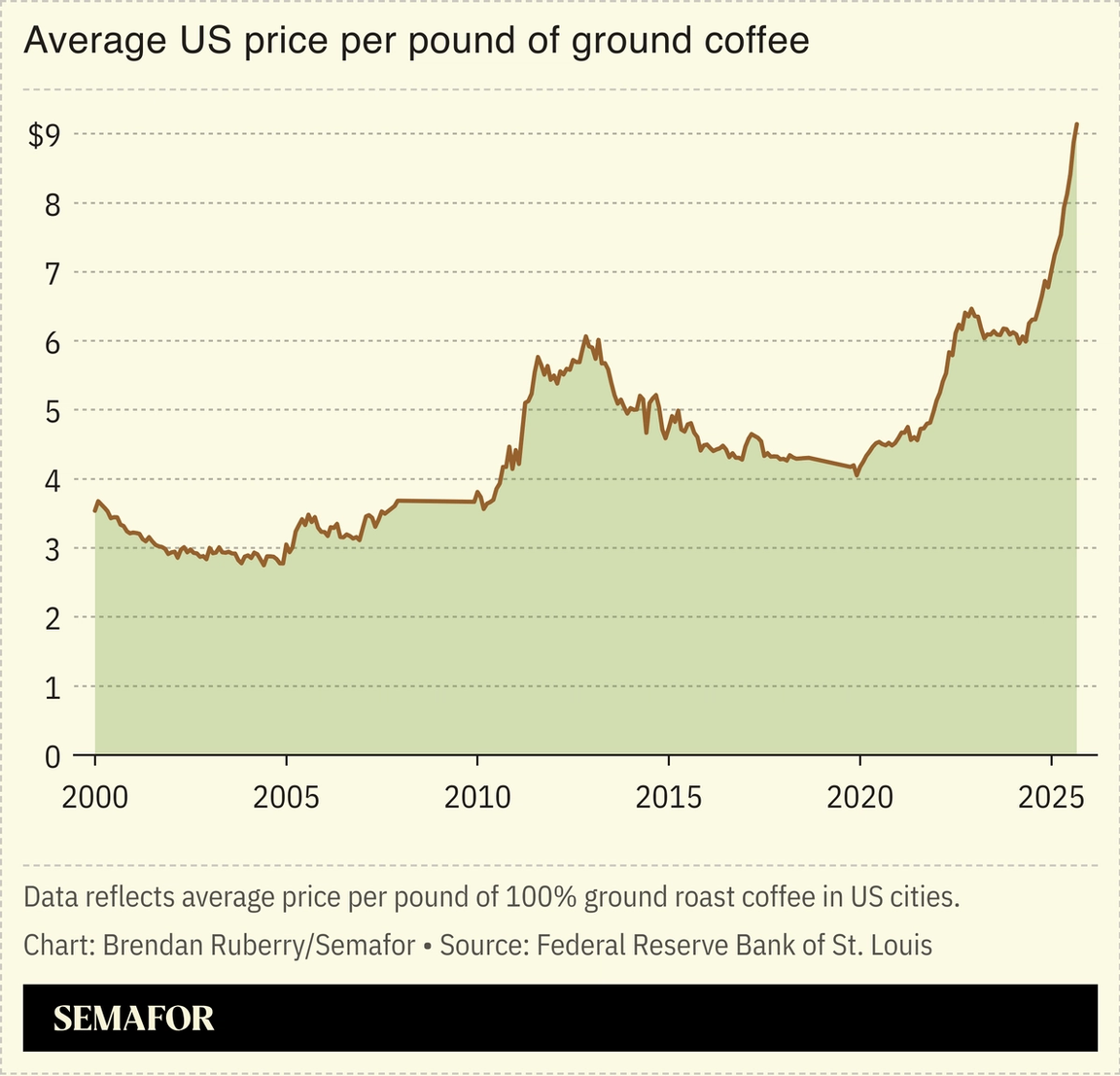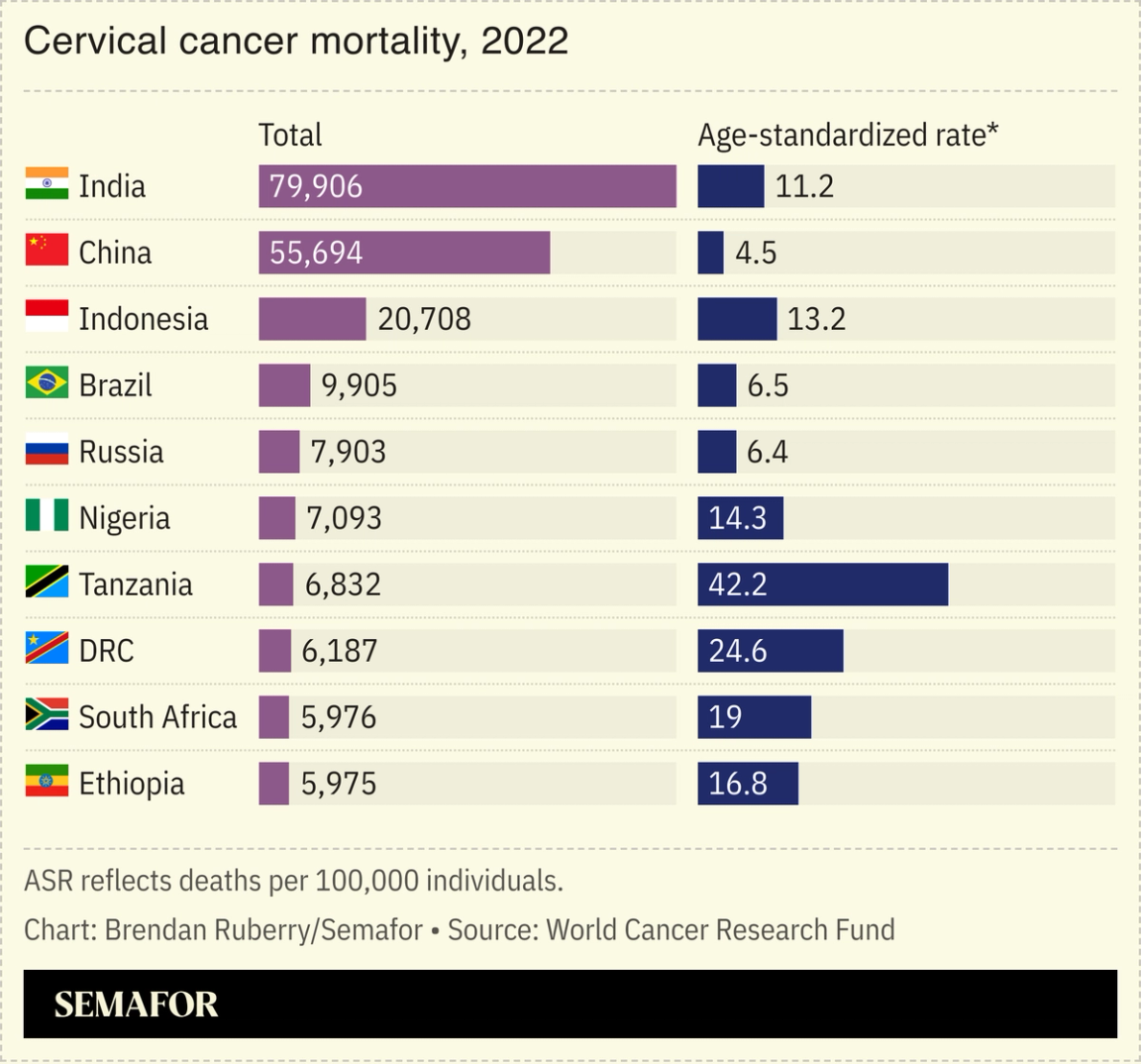| | Donald Trump and Mohammed bin Salman exchange praise and pledges at the White House, cervical cancer͏ ͏ ͏ ͏ ͏ ͏ |
| |  | Flagship |  |
| |
|
The World Today |  - Trump and MBS meet
- Diplomacy split screen
- Europe is vulnerable
- China trusts AI more than US
- Another big tech deal
- Another big internet outage
- US softens on tariffs
- HPV vaccine milestone
- Africa’s lead poisoning crisis
- Ireland artist stipend
 Norman Rockwell could make a return to the White House. |
|
Trump, MBS tout closer ties |
 Evelyn Hockstein/Reuters Evelyn Hockstein/ReutersUS President Donald Trump’s Oval Office meeting with Saudi Arabia’s crown prince on Tuesday brimmed with flattery and investment pledges. Trump called Mohammed bin Salman his “very good friend” and dismissed a question about the royal’s role in the 2018 killing of a Saudi journalist. The president also touted billions in planned Saudi investments in the US, and said Washington would sell F-35 fighter jets to Riyadh. Saudi’s sovereign wealth fund-backed AI company Humain is set to announce a slew of new deals with US firms on Tuesday, Semafor reported — part of the kingdom’s efforts to become a leader in exporting AI and turn its “oil wealth into tech influence,” The New York Times wrote. |
|
Split screen in global diplomacy |
 Adriano Machado/Reuters Adriano Machado/ReutersIn Washington, the unilateral American president made deals with a powerful Gulf monarch. In Brazil and South Africa, leaders are struggling to define rules for the rest of the world. The Saudi crown prince pledged $1 trillion in US investments during his meeting with Donald Trump on Tuesday, but it’s the two leaders’ family business links that offer “a new twist in the decadeslong US-Saudi relationship that was built on institutional ties,” Semafor’s Gulf editor wrote. Meanwhile, the COP30 climate conference in Brazil has yet to resolve key issues and is “drowning in stupid homework,” a Panamanian envoy said. And the upcoming G20 summit in Johannesburg is defined more by its absences, including Trump and China's Xi Jinping, than its ambitions. |
|
Europe is vulnerable to exploitation |
 Europe’s weakness is leaving it vulnerable to exploitation by other powers. The EU’s main strength is trade — but it accepted an unfavorable trade deal with the US, the Financial Times’ Gideon Rachman noted, for fear that Washington would reduce its security commitments in Europe. China, Russia, and Turkey have growing influence over the Balkan regions on the EU periphery, and the bloc’s internal fragmentation allows outside players to divide and rule: A “scramble for Europe,” like the continent’s own scramble for Africa in the 19th century, is under way, Rachman argued. In China, Europe is seen as weak and divided, The Economist reported, and a pawn of Washington, although Beijing may underestimate Brussels’ willingness to push back if challenged. |
|
China’s public embraces AI |
 China’s public is much more trusting of AI than the Western world, a new Edelman survey showed, a divide that could be critical in the fight for technological domination. In China, 54% of people said they embrace greater AI use, compared to just 17% in the US; Chinese respondents were also more likely to believe AI can rectify climate change, mental health, and poverty. The enthusiasm reflects how the tech has become entrenched in Chinese life — starting from childhood — and could give Beijing an edge as it challenges the US’ lead. Silicon Valley startups are increasingly running on lower-cost Chinese AI models, which “seemingly come out of nowhere to close the performance gap” with their US counterparts, a Bloomberg columnist wrote. |
|
Anthropic pact reflects AI circularity |
 Nvidia CEO Jensen Huang and Anthropic CEO Dario Amodei. Ann Wang/Yves Herman/Reuters Nvidia CEO Jensen Huang and Anthropic CEO Dario Amodei. Ann Wang/Yves Herman/ReutersAnthropic’s valuation rose to $350 billion Tuesday, after Microsoft and Nvidia announced investments in the AI startup, the latest agreement tying together prominent American tech players. Anthropic, which makes popular chatbot Claude, in turn made a $30 billion commitment to use Microsoft’s cloud services, as the tech giant tries to reduce reliance on OpenAI. Such eight-figure AI deals are becoming both increasingly common — “These announcements don’t hit like they used to huh,” Bloomberg’s Joe Weisenthal quipped — as well as circular: Companies are essentially funding their own customers, raising fears of a bubble. A Goldman Sachs strategist questioned on a recent podcast whether this is “all ultimately a house of cards, with everyone propping each other up.” |
|
Another outage brings down much of the web |
 Yves Herman/Reuters Yves Herman/ReutersAn outage at a major cybersecurity company brought down much of the internet for several hours on Tuesday. Cloudflare provides encryption, cyber defense, and other services for about a fifth of all websites. Its collapse — which reportedly wasn’t caused by a hack — hit the AI chatbots Claude and ChatGPT, among dozens of other sites and apps. The problem again revealed the internet’s vulnerability to single points of failure: An outage at Amazon Web Services, the largest cloud provider, disrupted banks, airlines, and other platforms in October. Microsoft and Alphabet’s cloud services also had significant recent collapses. A few major companies are “the infrastructure of the internet,” an expert told The Guardian, “so when one of them fails it becomes really obvious.” |
|
Trump prioritizes food prices over tariffs |
 The White House’s move to exempt several agricultural imports from tariffs represents a marked softening of Donald Trump’s sweeping trade agenda, analysts said. Officials said last week that the duties would no longer apply to products including bananas, coffee, and tea. It’s a relief to some major trading partners — nearly half of the Philippines’ exports to the US, for example, will now enter tariff-free. The backpedaling shows how domestic concerns over affordability are challenging Trump’s tariff campaign: “The president has left himself politically exposed after attempting such a risky strategy to remake the global trading system that almost every economist predicted would raise prices,” a CNN analyst wrote. |
|
 Get the world in your inbox with the Daily News Brief. Each weekday, our free newsletter curates global news with expert-informed analysis from the Council on Foreign Relations. For more than a century, CFR has guided leaders and citizens alike through moments of profound change. Subscribe today to understand the choices and challenges shaping our world. |
|
HPV vaccine prevents 1M+ deaths |
 A successful push to expand uptake of the HPV vaccine will prevent an estimated 1.4 million deaths from cervical cancer, marking a major milestone for global health. Around 86 million girls in high-risk countries were inoculated, Gavi, the Vaccine Alliance announced, as part of a three-year campaign to ramp up access especially in low-income nations: Clinicians rode camels to vaccinate remote herding communities, and traveled by boat to villages that sit on riverbanks, Gavi’s HPV program head told the BBC’s Global News podcast. But Gavi’s work is threatened by the $3 billion shortfall left by US aid cuts — a deficit that will necessitate “difficult decisions,” a spokesperson told CNN. |
|
Lead recycling poisons African towns |
 Adnan Abidi/Reuters Adnan Abidi/ReutersUS car batteries are using recycled lead processed in factories that are poisoning communities across Africa, a sweeping investigation found. Hampered by US regulations, automakers have turned to Africa to recycle lead as a cheaper way to make car batteries, hailing it as an environmental win. But it triggered a “preventable public health disaster,” according to The New York Times and The Examination; they tested the blood of 70 people working in and living around factories near Lagos and found that 70% had harmful lead levels. Battery recycling is a “bad investment unless you’re dirty,” said the manager of one Nigerian company that shut down. “Healthwise, we made a correct decision, but businesswise, we made a very bad decision.” |
|
|